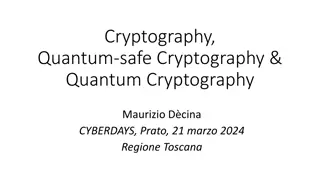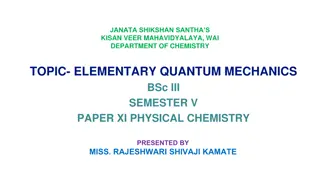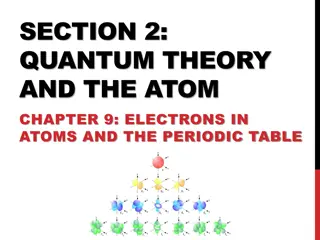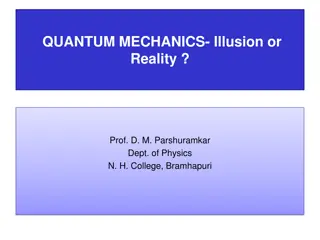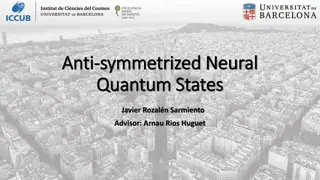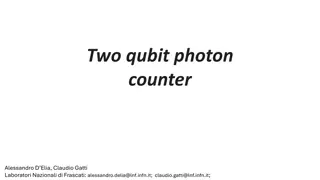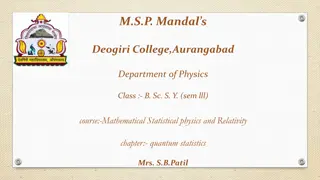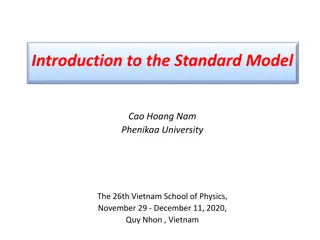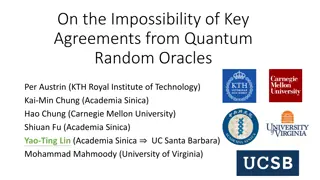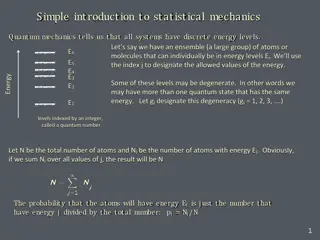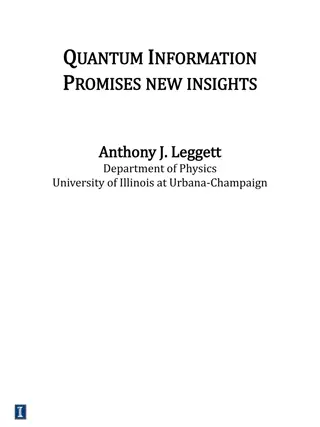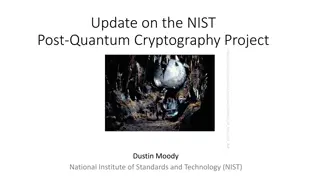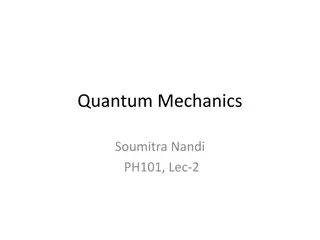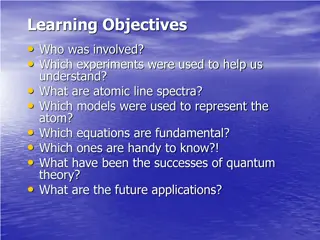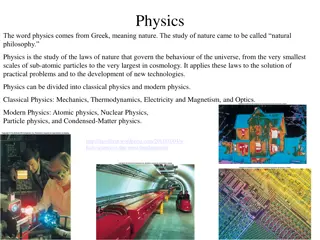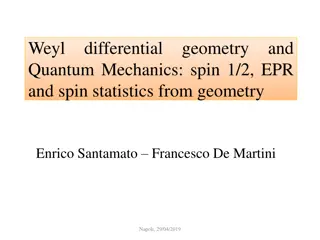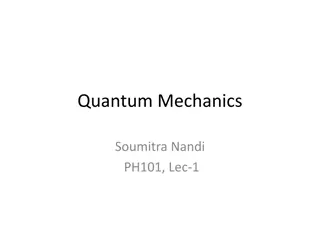Heisenberg and the Incomplete Ability of Quantum Mechanics
A nuanced exploration of Heisenberg's role in the history of Modal Interpretations, revealing how he anticipates MIs. Discussions include contemporary views, Dieks' explanations on modal interpretations, and Heisenberg's stance on quantum propensities. The presentation emphasizes the transition from potentialities to actualities in quantum events.
Uploaded on Sep 30, 2024 | 2 Views
Download Presentation

Please find below an Image/Link to download the presentation.
The content on the website is provided AS IS for your information and personal use only. It may not be sold, licensed, or shared on other websites without obtaining consent from the author.If you encounter any issues during the download, it is possible that the publisher has removed the file from their server.
You are allowed to download the files provided on this website for personal or commercial use, subject to the condition that they are used lawfully. All files are the property of their respective owners.
The content on the website is provided AS IS for your information and personal use only. It may not be sold, licensed, or shared on other websites without obtaining consent from the author.
E N D
Presentation Transcript
Heisenberg and the Incomplete-ability of Quantum Mechanics Elise M. Crull The City College of New York, CUNY Abner Shimony Forum @ Boston University 9 October 2015
Synopsis 1. Contemporary Modal Interpretations (MIs) 2. Heisenberg s usual role in the history of MIs 3. Expanding & Improving Heisenberg s role Thesis: A richer, more nuanced history of Heisenberg s thought reveals to greater degree & in a more plausible manner the sense in which he anticipates MIs.
Modal Interpretations Dieks SEP entry on MIs (2009) van Fraassen s original (1972 ff.) proposal for Q State: Dynamical state usual vector state describing possibilia Value state actual(ized) state assigning sharp values to observables Privileging function necessitated by Kocken-Specker Thrm Dieks: One should not consider this modality as arising from an incompleteness of the description (my emphasis)
Modal Interpretations Dieks SEP on MIs (2009) Event space on which prob measure is defined is space of possible events; only one from this space is actualized Implies objective probabilities. Two responses to this: Bite the Bullet: claim possible reduces (ontologically) to actual (n.b. no need for observer, though) Invoke Propensities: propensities are ontologically primal; reduction of possible to actual reflects ignorance of these
Modal Interpretations Dieks SEP on MIs (2009) Shared characteristics of MIs: No projection postulate (no collapse of Psi) Realist, i.e., assume Q systems possess [some?] definite properties at all times QM is fundamental (explains QM CM) Dynamical state (pure or mixed) gives possible properties & corresponding probabilities
Heisenbergs Role Su rez (2007) Quantum Propensities , SHPMP. Aristotelian notion of potentialities in Heis s 1958: The probability function combines objective and subjective elements. It contains statements about possibilities and these statement are completely objective ; and it contains statements about our knowledge of the system, which of course are subjective (p. 53; as quoted in Su rez pp. 422-423) We may say that the transition from the possible to the actual takes place as soon as the interaction of the object with the measuring device, and thereby with the rest of the world, has come into play. (p.54; loc. cit.) In experiments about atomic events we have to do with things and facts, with phenomena that are just as real as any phenomena in daily life. But the atoms or the elementary particles themselves are not as real; they form a world of potentialities or possibilities rather than one of things or facts. (p. 160; loc. cit.)
Heisenbergs Role Camilleri (2009) Heisenberg and the Interpretation of Quantum Mechanics, CUP. Heisenberg s philosophy in post-war era: Heisenberg argues that fundamental theories in physics allow us to know something about the mathematical form or structural of the physical world, though they do not give us direct knowledge of the nature or essence of the entities of physics. (p. 57) If we attempt to penetrate behind this reality into the details of atomic events, the contours of this objectively real world dissolve not in the mist of a new and yet unclear idea of reality, but into the transparent clarity of a mathematics whose laws govern the possible and not the actual. (Heis. 1955 p. 28; as quoted in Camilleri p. 160)
Expanding Heisenbergs Role: Pre-war contributions Already in 1927 hints at incomplete-ability due to objective probability Correspondence with Einstein (June) Indeterminism is ``necessary, not just consistently possible Discussions at Como (Sept) For a new observation, the wave packet gives the probability of finding the electron at a determined position. The new observation itself however reduces the packet to its original magnitude q, which makes a selection from a totality of possibilities and thereby reduces the possibilities for the future. This continual change of the wave picture at an observation appears to me a fundamental feature of quantum mechanics. One must just put into practice the conception of `probability waves . (Bohr 1985, p. 140) Solvay Report with Born (Oct) & discussion of transition probabilities: What Born and Heisenberg mean by usual transition probabilities bears some resemblance to the notion of potentialities or propensities familiar from the philosophy of probability starting in the 1950s (e.g. Popper, 1959). Indeed, Born and Heisenberg s transition probabilities are well defined even when there is no value that could make a transition. (Bacciagaluppi & Crull 2009)
Heisenbergs Unpublished Response to EPR (1935) Ist eine deterministische Erg nzung der Quantenmechanik m glich? No. (Analyzed in our 2009) 2 parts of Cut Arg: movable & responsible for probabilities [W]e shall examine the assumption that the physical systems about which quantum mechanics makes statistical assertions are carriers of heretofore unknown physical characteristics that univocally determine the behavior heretofore known only statistically. For example, let us assume that the nucleus of the radium atom somehow possesses, in addition to the properties established through knowledge of its stationary state, still other previously unknown characteristics whose knowledge makes possible an exact prediction of when the atomic nucleus will emit an alpha-particle. And we assume specifically: this assertion should hold independently of the means of observation that are applied for the confirmation of the emission of the alpha particle. One can at first try letting this last particular assumption drop, and allow that the radioactive emission be also conditioned by the characteristic of the means of observation.
Heisenbergs Unpublished Response to EPR (1935) Argument for impossibility of context-indep t HVs: When the cut is between A and B, freedom (possibility) at B to measure either a variable qAof A or conjugate variable pA Assume HVs and remove the cut beyond B QM predictions for pAhere require indeterminacy in value of qA But this contradicts the existence of HVs Considered from MI perspective: Heis. takes probabilities to be (simultaneously) well defined - recall Solvay. This argument crucially depends on inability of all values to be well defined simultaneously Query: might he understand already the need for privileged observables?
Heisenbergs Unpublished Response to EPR (1935) I say yes, based on final section of his response to EPR: Observational Contexts [T]he same anschaulich process can belong to different observational contexts as opposed to classical physics, in which there is only a single observational context. The experimental results accumulated in quantum mechanics have further shown that the observation of a system in general leads discontinuously from one observational context to another. The causal flow can be followed only within a given observational context; in the discontinuous transition from one observational context to another (in fact a complementary one in the Bohrian sense), only statistical predictions are possible. The possibility of different complementary observational contexts, unknown to the classical theory, is thus responsible for the occurrence of statistical laws.
How Heisenberg pre-dated himself regarding MIs Dieks 4 shared traits of MIs fail in post-war Heisenberg: No projection postulate (no collapse of Psi) Heis speaks often of collapse after the war Realist, i.e., assume Q systems possess [some?] definite properties at all times Unclear, given talk about world of potentialities QM is fundamental (explains QM CM) Linguistic turn (Camilleri) seems to drive Heis from unified picture of actual world (appeal to semantics instead) Aristotelian potentia at times sound like measures of rational degrees of belief (Su rez) Dynamical state (pure or mixed) gives possible properties & corresponding probabilities Su rez argues Heis fails to distinguish carefully between probabilities and property values
How Heisenberg pre-dated himself regarding MIs Dieks 4 shared traits succeed in pre-war Heisenberg: No projection postulate (no collapse of Psi) Heis uses term reduktion in 1927; no collapse or reduction mentioned in 1935 Realist, i.e., assume Q systems possess [some?] definite properties at all times Heis is clear that not all properties can have definite values (response to non-contextual HVs/context of observation) Good arguments emerge from scrutiny of 1925-1935 writings as to Heis s nuanced philo, in particular unfair label of positivist/operationalist QM is fundamental (explains QM CM) Args in 1935 (esp. Cut) make clear his QM fundamentalism Dynamical state (pure or mixed) gives possible properties & corresponding probabilities Seeds of comprehending mixed states in discussion of observational context Non-contextual HV considerations anticipating Kocken-Specker at least in recognizing need for privileging function
A better, earlier MI? Recall 2 possible MI responses to objective probability: Bite the Bullet: claim possible reduces (ontologically) to actual (n.b. no need for observer, though) Invoke Propensities: propensities are ontologically primal; reduction of possible to actual reflects ignorance of these Conclusion In as much as serious doubt has been cast on propensity talk,* and in light of claim that pre-war Heis bites the bullet in response to objective probability, I suggest that we consider Heisenberg s proto-MI to be better, earlier. *cf. Eagle s 2004 Erkenntnis paper: Twenty-one arguments against propensity


